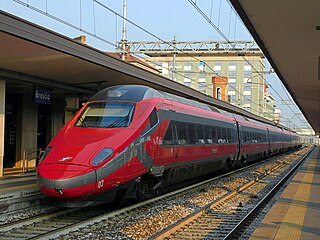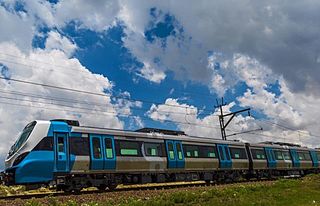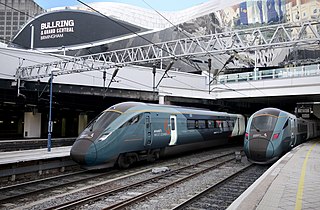
Eurostar is an international high-speed rail service in Western Europe, connecting Belgium, France, Germany, the Netherlands and the United Kingdom.

Alstom is a French multinational rolling stock manufacturer which operates worldwide in rail transport markets. It is active in the fields of passenger transportation, signaling, and locomotives, producing high-speed, suburban, regional and urban trains along with trams.

Pendolino is an Italian family of high-speed tilting trains used in Italy, Spain, Germany, Poland, Portugal, Slovenia, Finland, Russia, the Czech Republic, Slovakia, the UK, the US, Switzerland, China, and Greece. Based on the design of the Italian ETR 401, it was further developed and manufactured by Fiat Ferroviaria, which was taken over by Alstom in 2000.

RailTel Corporation of India Ltd. is an Indian public sector enterprise which provides broadband and VPN services. RailTel was formed in September 2000 with the objective of creating a nationwide broadband, telecom and multimedia network, and to modernise train control operation and safety system of Indian Railways. RailTel's network passes through around 5,000 stations across the country, covering all major commercial centres.
Eurostar International Limited (EIL) is the railway company operating the international Eurostar train services between London, Paris, Amsterdam and Brussels via the Channel Tunnel. Eurostar was previously operated by three separate companies in Belgium, France and the United Kingdom, but this structure was replaced by EIL as a new single management company on 1 September 2010. EIL is owned by Eurostar Group.

PKP Intercity is a company of PKP Group responsible for long-distance passenger transport. It runs about 350 trains daily, connecting mainly large agglomerations and smaller towns in Poland. The company also provides most international trains to and from Poland. Trains offer Wi-Fi connectivity.
Siemens Mobility is a division of Siemens. With its global headquarters in Munich, Siemens Mobility has four core business units: Mobility Management, dedicated to rail technology and intelligent traffic systems, Railway Electrification, Rolling Stock, and Customer Services.

Gogo Inc. is an American provider of in-flight broadband Internet service and other connectivity services for business aircraft, headquartered in Broomfield, Colorado. Through its Gogo LLC subsidiary, Gogo previously provided in-flight WiFi to 17 airlines until the Commercial Air business was sold to Intelsat for $400 million in December 2020. According to Gogo, over 2,500 commercial aircraft and 6,600 business aircraft have been equipped with its onboard Wi-Fi services. The company is the developer of 2Ku, new in-flight satellite-based Wi-Fi technology rolled out in 2015.
Radwin is a wireless broadband hardware manufacturing company headquartered in Tel Aviv, Israel. It develops and creates wireless telecoms systems. Its products are used by telecoms carriers, city and town councils, remote communities, ISPs, WISPs, and private networks. It also provides hardware for moving applications such as metro systems, bus networks, ferries and airports, as well as vehicles such as patrol vehicles, manned and unmanned heavy machinery in mines and ports. The hardware is used for applications including mobile and IP backhaul, home and enterprise wireless broadband access, private network connectivity and video surveillance transmission. As part of the Smart City initiative in India by Prime Minister Narendra Modi, Radwin teamed up with Avaya in 2016.

Lumo is a British open-access operator owned by FirstGroup that operates passenger trains on the East Coast Main Line between London King's Cross and Edinburgh Waverley. It is headquartered in Newcastle upon Tyne.

BharatNet, also known as Bharat Broadband Network Limited (BBNL), is a central public sector undertaking, set up by the Department of Telecommunications, a department under Ministry of Communications of the Government of India for the establishment, management, and operation of the National Optical Fibre Network to provide a minimum of 100 Mbit/s broadband connectivity to all 250,000-gram panchayats in the country, covering nearly 625,000 villages, by improving the middle layer of nation-wide broadband internet in India to achieve the goal of Digital India.

The British Rail Class 374, also referred to as the Eurostar e320, is a type of electric multiple unit passenger train used on Eurostar services through the Channel Tunnel to serve destinations beyond the core routes to Paris and Brussels. They began to run passenger services in November 2015. The trains, owned by Eurostar International Limited, are sixteen-coach versions of the Siemens Velaro. Each train is 390.2 m (1,280 ft) long. The trains are compliant with the Technical Specifications for Interoperability (TSI).
Veniam was a technology startup focused on building large WiFi mesh networks using moving vehicles like city buses or taxis. The company is headquartered in Mountain View, California and was founded in 2012. The Company received 4.9 million dollars in 2014 in a funding round from True Ventures, USV and Cane Investments. Veniam's technology is being used in Porto's city buses with about 230,000 users with onboard units (OBUs) installed on over 600 buses, taxis and garbage trucks. They aim to equip many moving things with wireless hotspots creating a mesh that could be used to build sensors to turn the city smarter.Each vehicle is equipped with a NetRider, a multi network unit with Wi-Fi (802.11p), DSRC, GPS and 4G/LTE connectivity. Veniam was acquired by Nexar in 2022.
GoMedia is a British company which supplies a management system which delivers entertainment packages including featuring films to travelers on trains and coaches, including on Eurostar trains. The system also gives real-time travel information. Rather than using a monitor on the seat in front of the passenger, it uses the passenger's own device such as mobiles and tablets. It uses the vehicle's own Wi-Fi rather than the passenger's independent mobile network for on-board infotainment.

The X'Trapolis Mega is an electric multiple unit, part of the X'Trapolis family, built by Gibela for the Passenger Rail Agency of South Africa (PRASA) that operates in Metrorail commuter service.
Express Wi-Fi is a division within Facebook Connectivity, a group of global internet connectivity initiatives by Meta. As one of several programs under the Facebook Connectivity umbrella, it partners with mobile network operators and internet service providers to provide internet access via public Wi-Fi hotspots.
Google Station was a Google service that allowed partners to roll out Wi-Fi hotspots in public places by providing software and advice on hardware to turn fiber connections into Wi-Fi. It was only implemented in India and Indonesia but in March 2018, the service was launched in Mexico. In February 2020, Google announced the service would be discontinued. The service went offline on September 30, 2020.

The TGV M is a high-speed passenger train designed and produced by Alstom. It has a broadly similar design to the TGV Duplex sets, with bi-level carriages and a push–pull configuration with a power car on either end. However, it is more energy efficient and provides lower operating costs.
Passenger Wi-Fi on subway trains is a service provided primarily for wireless internet access for metro passengers on board subway trains.

The British Rail Class 807 AT300 is a type of electric multiple unit being built by Hitachi Rail for train operator Avanti West Coast. Based on the Hitachi A-train design, a total of 10 seven-car units will be produced.














